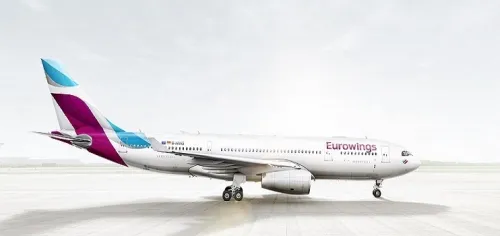
Eurowings loses long-haul flying in restructure
Jun 25, 2019

Eurowings has announced significant changes to its long-haul operations as part of a restructuring strategy aimed at adapting to the evolving airline market. The airline will focus on consolidating its resources and streamlining its operations, leading to the suspension of several long-distance routes. This decision reflects challenges in maintaining profitability and competition in the long-haul segment. As a result, Eurowings plans to redirect its efforts toward enhancing its short-haul services, aiming to strengthen its position within the European market while navigating the ongoing impacts of the global travel landscape.
Eurowings, a subsidiary of the Lufthansa Group, has made significant changes to its operational strategy as part of a broader restructuring initiative. This shift has led to the airline exiting the long-haul market, focusing instead on its strengths in short and medium-haul flights. The decision reflects a strategic pivot aimed at increasing profitability and streamlining operations in an increasingly competitive aviation landscape.
The Impact of Restructuring on Eurowings
As Eurowings undergoes this transformation, the most notable impact is the cessation of long-haul flights. The airline had previously aimed to establish itself as a low-cost carrier capable of competing in the transatlantic market. However, the challenges posed by high operational costs, fluctuating demand, and the ongoing effects of the COVID-19 pandemic have necessitated a reevaluation of its long-haul strategy.
In the wake of this decision, Eurowings is focusing its resources on enhancing its short-haul and medium-haul offerings. This includes expanding its route network in Europe and optimizing its fleet for these markets. By doing so, Eurowings aims to improve efficiency and customer satisfaction.
| Key Changes in Eurowings' Operations | Details |
|---|---|
| Exit from Long-Haul Market | Discontinuation of all long-haul flights |
| Focus on Short and Medium-Haul Flights | Expansion of European routes |
| Fleet Optimization | Adjustment to aircraft types suitable for shorter distances |
Why the Shift to Short and Medium-Haul?
The decision to concentrate on short and medium-haul flights stems from several factors. Firstly, the demand for domestic and intra-European travel has rebounded more quickly than long-haul travel post-pandemic. According to industry reports, travelers have shown a preference for shorter trips, leading to increased booking volumes for airlines focusing on regional flights.
Secondly, short-haul flights typically yield higher profit margins compared to long-haul routes. The operational costs associated with long-haul flights, such as fuel prices and crew expenses, are significantly higher. By focusing on shorter routes, Eurowings can reduce these costs while increasing frequency, which often leads to improved load factors and better overall revenue.
Customer Experience Enhancements
As part of its restructuring, Eurowings is also committed to enhancing the customer experience. The airline has recognized that in a competitive market, providing exceptional service is crucial for retaining customers and attracting new ones. Key initiatives include:
- Upgrading in-flight services, including improved meal options and entertainment systems.
- Implementing a more user-friendly booking process, enhancing customer interactions through digital platforms.
- Expanding loyalty programs to reward frequent travelers and encourage repeat business.
The Future of Eurowings
Looking ahead, Eurowings is poised to carve a niche for itself in the European aviation market. By focusing on its core competencies and streamlining operations, the airline aims to achieve sustainable growth. This strategy aligns with broader trends in the industry, where airlines are increasingly prioritizing efficiency and customer experience.
Eurowings' restructuring may also present opportunities for partnerships and code-sharing agreements with other airlines within the Lufthansa Group. These collaborations could enhance the airline's network and provide customers with more travel options, further solidifying its position in the market.
Conclusion
In summary, Eurowings' decision to exit the long-haul flying segment is a bold move that reflects the current dynamics of the airline industry. By narrowing its focus to short and medium-haul flights, the airline aims to improve its financial performance and customer satisfaction. This strategic pivot not only positions Eurowings for future success but also showcases the importance of adaptability in a rapidly changing market.
As the airline continues to evolve, staying informed about its developments will be crucial for travelers and industry stakeholders alike. The focus on enhancing customer experiences and operational efficiency will likely play a pivotal role in shaping Eurowings' future.
Related Articles

Explore Thailand: The Best Islands to Visit for Paradise, Adventure, and Relaxation

The Ultimate Guide to the Best Islands in Thailand for Your Next Getaway

Do babies need passports? How to get a passport for a newborn

How to get a U.S. passport fast: here’s how to expedite the process

What is Mobile Passport Control: 5 reasons why you should use it

SENTRI vs. Global Entry: A detailed guide

Do you need a passport to go to the Bahamas? Let’s find out

Do you need a passport to go to Mexico? A detailed guide

Do you need a passport to go to Canada? We got the answer

Do You Need a Passport for a Cruise: An Essential Travel Guide

Booster Seat Requirements: All the Rules to Follow in Your Rental Car

What Are the World’s Most Powerful Passports, and How Does Yours Rank?

How to Take a Passport Photo at Home: A Helpful Guide

You've got to have heart! Southwest's new livery

Your opinion: Should water be free on low cost carriers?

Young women bolder than guys as solo travellers
